Early life
Trapnel was born in Poplar in the parish of Stepney to the east of the City of London to William Trapnel, a shipwright, and Anne.
Anna Trapnel (1620-?) was a travelling Baptist prophet and Fifth Monarchist active in England in the 1650s.
Trapnel was born in Poplar in the parish of Stepney to the east of the City of London to William Trapnel, a shipwright, and Anne.
This article needs additional citations for verification .(March 2019) |
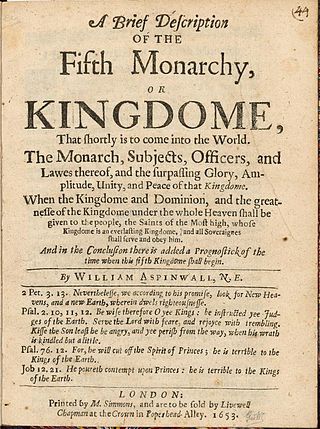
The Fifth Monarchists, or Fifth Monarchy Men, were a Protestant sect with millennialist views active between 1649 and 1660 in the Commonwealth of England. The group took its name from a prophecy that claimed the four kingdoms of Daniel would precede the fifth, which would see the establishment of the kingship and kingdom of God on Earth.

Margaret Cavendish, Duchess of Newcastle-upon-Tyne was a prolific English philosopher, poet, scientist, fiction writer and playwright. She produced more than 12 original literary works, many of which became well known due to her high social status, which allowed Margaret to meet and converse with some of the most important and influential minds of her time.

An antiquarian or antiquary is an aficionado or student of antiquities or things of the past. More specifically, the term is used for those who study history with particular attention to ancient artefacts, archaeological and historic sites, or historic archives and manuscripts. The essence of antiquarianism is a focus on the empirical evidence of the past, and is perhaps best encapsulated in the motto adopted by the 18th-century antiquary Sir Richard Colt Hoare, "We speak from facts, not theory."
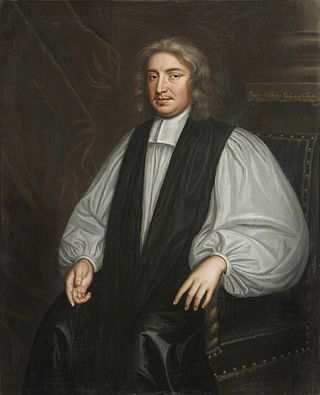
John Wilkins was an Anglican clergyman, natural philosopher, and author, and was one of the founders of the Royal Society. He was Bishop of Chester from 1668 until his death.

Barebone's Parliament, also known as the Little Parliament, the Nominated Assembly and the Parliament of Saints, came into being on 4 July 1653, and was the last attempt of the English Commonwealth to find a stable political form before the installation of Oliver Cromwell as Lord Protector. It was an assembly entirely nominated by Oliver Cromwell and the Army's Council of Officers. It acquired its name from the nominee for the City of London, Praise-God Barebone. The Speaker of the House was Francis Rous. The total number of nominees was 140, 129 from England, five from Scotland and six from Ireland.
Lawrence Stone was an English historian of early modern Britain, after a start to his career as an art historian of English medieval art. He is noted for his work on the English Civil War and the history of marriage, families and the aristocracy.
Western literature, also known as European literature, is the literature written in the context of Western culture in the languages of Europe, and is shaped by the periods in which they were conceived, with each period containing prominent western authors, poets, and pieces of literature.

Anna Maria van Schurman was a Dutch painter, engraver, poet, classical scholar, philosopher, and feminist writer who is best known for her exceptional learning and her defence of female education. She was a highly educated woman, who excelled in art, music, and literature, and became a polyglot proficient in fourteen languages, including Latin, Ancient Greek, Biblical Hebrew, Arabic, Syriac, Aramaic, and Ethiopic, as well as various contemporary European languages. She was the first woman to unofficially study at a Dutch university.
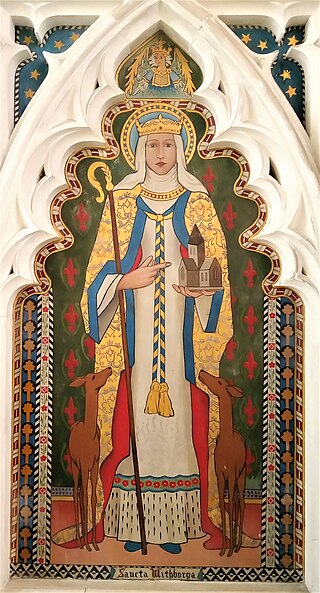
Wihtburh was an East Anglian saint, princess and abbess. According to tradition, she was the youngest daughter of Anna, king of the East Angles, but Virginia Blanton has suggested that the royal connection was probably a fabrication. One story says that the Virgin Mary sent a pair of female deer to provide milk for Wihtburh's workers during the construction of her convent at Dereham, in Norfolk. When a local official attempted to hunt down the does, he was thrown from his horse and killed.

Lady Jane Cavendish (1621–1669) was a poet and playwright, the daughter of William Cavendish, Duke of Newcastle and later the wife of Charles Cheyne, Viscount Newhaven. Along with her literary achievements, Cavendish helped manage her father's properties while he spent the English Civil War in exile; she was responsible for a variety of military correspondences and for salvaging many of her family's valuable possessions. Later in life, she became an important community member in Chelsea, using her resources to make improvements on Chelsea Church and otherwise benefit her friends and neighbours. Marked by vitality, integrity, perseverance and creativity, Jane's life and works tell the story of a Royalist woman's indomitable spirit during the English Civil War and the English Restoration.
Cecilia Ferrazzi was an Italian Counter-Reformation Catholic mystic whose life was extensively involved with the establishment and maintenance of women's houses of refuge in seventeenth century Italy.

A biography, or simply bio, is a detailed description of a person's life. It involves more than just basic facts like education, work, relationships, and death; it portrays a person's experience of these life events. Unlike a profile or curriculum vitae (résumé), a biography presents a subject's life story, highlighting various aspects of their life, including intimate details of experience, and may include an analysis of the subject's personality.

Elizabeth Egerton, Countess of Bridgewater was an English writer who married into the Egerton family.
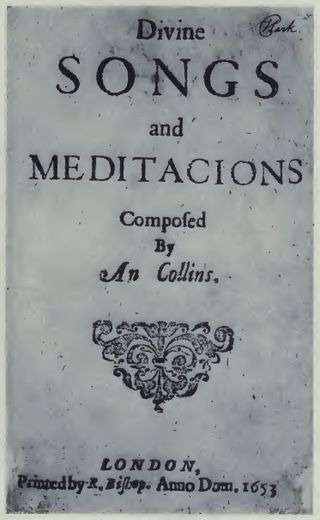
An Collins is the otherwise unknown poet credited with the authorship of Divine Songs and Meditacions, a collection of poems and prose meditations published in London in 1653.
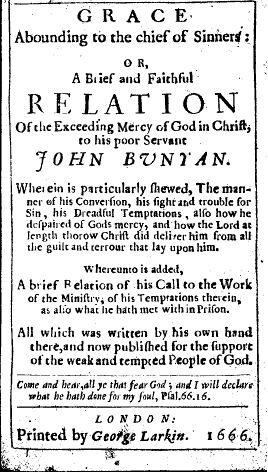
Spiritual autobiography is a genre of non-fiction prose that dominated Protestant writing during the seventeenth century, particularly in England, particularly that of Dissenters. The narrative generally follows the believer from a state of damnation to a state of grace; the most famous example is perhaps John Bunyan's Grace Abounding (1666). The first known spiritual autobiography is Confessions by Augustine of Hippo, or St. Augustine, which stands to this day as a classic when studying this genre.
HesterBiddle was an English Quaker writer and itinerant preacher who "addressed pugnacious pamphlets to those who persecuted religious dissenters, worshipped in the Anglican church, or refused to help the poor." She became a Quaker in 1654. Her subsequent preaching took her to Ireland and Scotland, Newfoundland, the Netherlands, Barbados, Alexandria and France.

Peter Chamberlen M.D. (1601–1683), known as Peter the Third, was an English physician. The obstetrical forceps as invention has been credited to the Chamberlen family: the earliest evidence of what was a family trade secret points to his having it in 1630. He continued the family tradition of trying to bring the profession of midwifery under their control. His writings blend ideas associated with the Fifth Monarchists and Levellers with social schemes of his own with a utopian flavour.
Lady Audrey Walsingham was an English courtier. She served as Lady of the Bedchamber to queen Elizabeth I of England, and then as Mistress of the Robes to Anne of Denmark from 1603 until 1619.
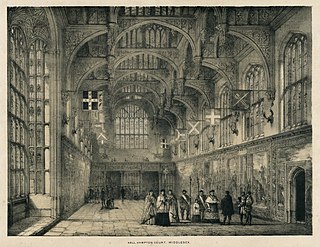
The Masque of Indian and China Knights was performed at Hampton Court in Richmond, England on 1 January 1604. The masque was not published, and no text survives. It was described in a letter written by Dudley Carleton. The historian Leeds Barroll prefers the title, Masque of the Orient Knights.
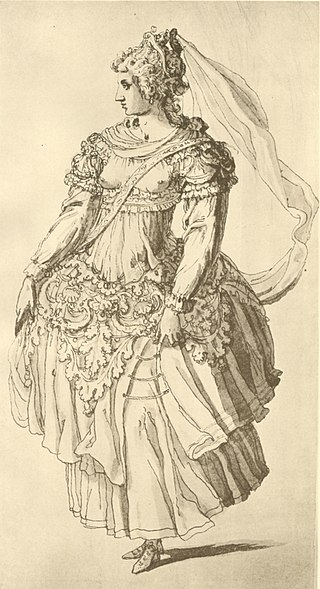
Oes or owes were metallic O-shaped rings or eyelets sewn on to clothes and furnishing textiles for decorative effect. Made of gold, silver, or copper, they were used on clothing and furnishing fabrics and were smaller than modern sequins. They were made either from rings of wire or punched out of a sheet of metal.